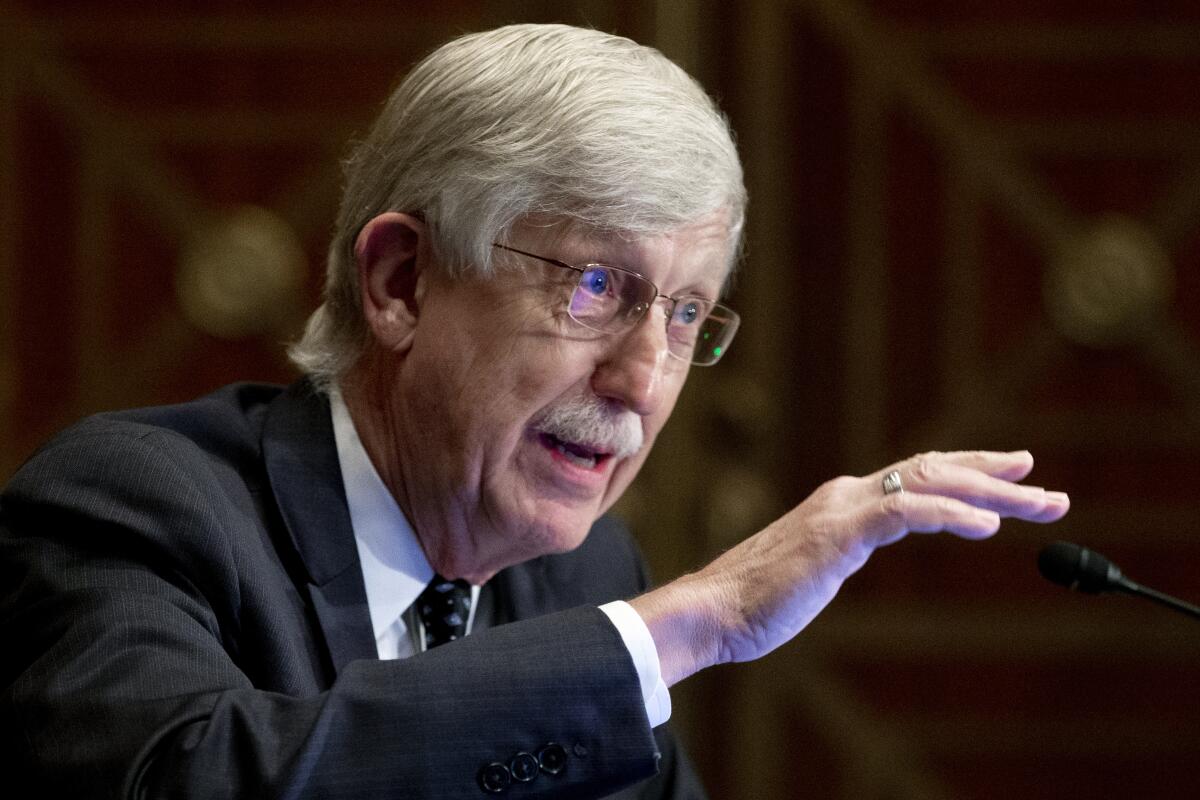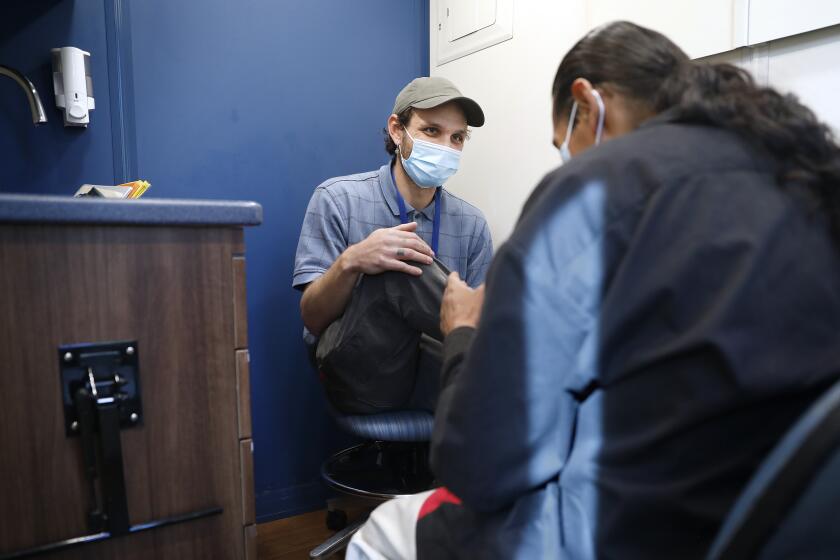Biden administration seeks billions to stop a killer: Hepatitis C

- Share via
The Biden administration is seeking billions of dollars for a new push to wipe out hepatitis C, a virus that has continued to kill thousands of people annually in the U.S. despite the existence of extremely effective medications that can cure the infection within months.
The five-year program, outlined as part of a broader budget proposal Thursday by White House officials, has been estimated to have a net cost of $5 billion over a decade, said Dr. Francis Collins, a special advisor to the president for special projects.
It would require an upfront investment now estimated at more than $11 billion over five years, which Collins said would be offset by government savings from preventing liver failure and other conditions that result from hepatitis C — and therefore avoiding the costs of treating them.
The exact costs would hinge on negotiations with drugmakers, who would be paid a lump sum to make an unlimited supply of direct-acting antiviral pills available to patients on Medicaid, as well as those who are uninsured, incarcerated or treated through the Indian Health Service, said Collins, the former director of the National Institutes of Health.
Such “subscription” deals have already been tested in some states in an effort to expand access to the lifesaving medication.
White House officials said the medicines can now cost roughly $20,000 per patient, but researchers have found curing patients can ultimately save money that would later be spent treating liver ailments.
One recent study of the Veterans Affairs system concluded that treating each hepatitis C patient would save more than $62,000 over time, resulting in billions in savings for the system.
The Biden administration argued that its plan would reduce Medicaid spending by “hundreds of millions of dollars” annually by 2032.
Hepatitis C can now be cured in most cases with antiviral medication. Yet in the U.S., only a fraction of people who are found to be infected promptly start treatment.
Collins and White House senior advisor Rachael Fleurence outlined more details of the proposed program Thursday in the Journal of the American Medical Assn.
Under the five-year plan, the Biden administration also wants to speed up clearance for “point-of-care” tests that will allow people to get tested and immediately start treatment during the same visit; train more medical providers to offer the medication; and reinvigorate efforts to develop a vaccine that could thwart reinfection with the virus, among other steps.
The proposed program also includes assistance with copayments for Medicare recipients struggling to pay for the pills, expansion of patient screening, and supporting community clinics and other access sites to link people to treatment.
The budget proposal released Thursday by the White House sets the stage for negotiations with Congress over the spending priorities put forward by President Biden. Collins said his hope is that “when members of Congress see what a unique opportunity this is to save lives” — as well as to save money in the long term — “it will be hard to just look away.”
“If we’re a country that cares about all of its people,” he said, “how can we say no?”
Dr. John W. Ward, director of the Coalition for Global Hepatitis Elimination at the Task Force for Global Health, praised the proposal and said it would be the biggest commitment to eliminating hepatitis C ever put forward by the federal government.
Wiping out hepatitis C “is an incredibly feasible goal for the nation to achieve,” he said.
“We have safe and effective therapies. We’ve shown we can do it for thousands of military veterans,” Ward said, citing previous efforts in the VA system. “Now it’s time to do it for the whole country.”
His coalition has assisted with modeling by university researchers on the lives and money that could be saved by a national program, he said, and “it’s a true win-win.”
Because the subscription model means “you have one cost to treat an unlimited number of patients,” it encourages medical providers to find and treat more people infected, Ward said.
Hepatitis C spreads through infected blood, including through shared needles or other equipment for injecting drugs. It has taken a disproportionate toll on marginalized groups, including people who inject drugs, are unhoused or have been incarcerated.
Millions of people are believed to be infected across the country, but many are unaware that they have the virus. It is a slow-moving killer that can take years to trigger symptoms, but if left untreated, hepatitis C can cause cirrhosis, cancer and ultimately death.
The infection can now be stopped, in most cases, by taking direct-acting antiviral medication for two to three months. Yet in the U.S., patients are not promptly getting treated: Only about a third of patients with private insurance and a quarter of those on Medicaid started the pills within roughly a year of getting diagnosed, Centers for Disease Control and Prevention researchers found.
Hepatitis C can be cured in most cases with a few months of medication. The number of Medi-Cal patients getting the treatment dropped during the pandemic.
Health researchers and advocates have faulted barriers to obtaining the costly pills put up by insurers, logistical obstacles in the step-by-step process for many patients to access treatment, and lingering misconceptions among physicians about the medication, among other challenges.
Although the steep cost of the medication has been an obvious hindrance, the rollout of programs in Washington state and Louisiana that provided upfront payment for an unlimited supply of the pills has underscored that costs are not the only obstacle to getting people treated.
In Washington state, the rate of treatment in its Medicaid program actually fell after its initiative began, as other aspects of its elimination plan were sidelined amid budget problems and the pandemic, a STAT investigation last year found.
Collins said the national effort had been crafted with the lessons learned in Washington, Louisiana and other states in mind.
For instance, “they lost a lot of people in between visits one, two and three” to obtain the treatment, Collins said, which shows why being able to test and start treating people in the same visit is important.
The “point-of-care” tests that could make that possible are already available outside of the U.S. and have been found to increase the likelihood of patients getting treated.
When existing programs to eliminate hepatitis C have struggled, it is often because “our healthcare system doesn’t meet people where they are,” said Rena Conti, an associate professor at Boston University’s Questrom School of Business who consulted Louisiana as an economist on its program.
Point-of-care testing in the hands of local providers ready to use it — paired with the curative drugs — is what “this program is really laying out as the answer here.”
More to Read
Sign up for Essential California
The most important California stories and recommendations in your inbox every morning.
You may occasionally receive promotional content from the Los Angeles Times.













